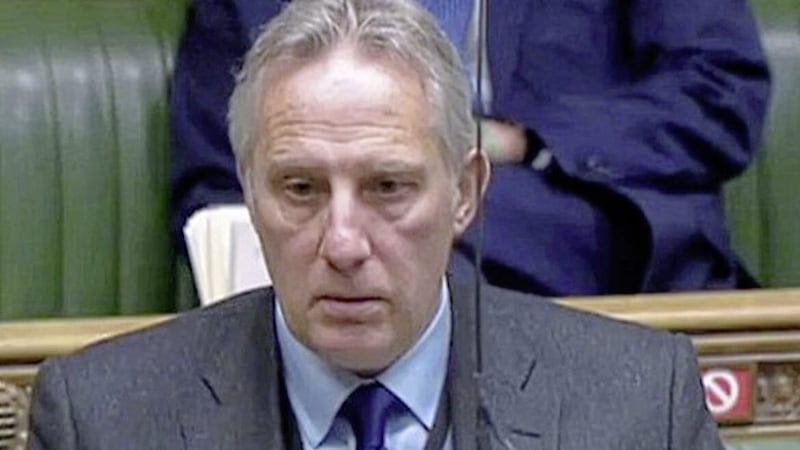For the last six years Ian Paisley has insisted, to paraphrase it fairly brutally, that those who voted against Brexit should just suck it up and acknowledge the fact that a 52-48 split was enough to remove the UK from the EU.
The additional fact that a majority in both Scotland and Northern Ireland voted to remain was dismissed by him as a nothing-to-see-here objection, because all that mattered was that a paper-thin majority (mostly sourced from votes in England) had opted to leave.
But something has changed. Changed enough to make him conclude that paper-thin majorities are no longer enough. Surprisingly though, his change of heart doesn’t embrace the Northern Ireland Protocol: because even though it was endorsed by a majority in the 2019 general election and then passed by a majority in both the Commons and Lords (parliamentary sovereignty in action) afterwards, he believes that unionists in general and the DUP in particular are perfectly entitled to do everything they can to force the shredding of an international agreement. No sucking it up for him!
So, what changed his mind? “The sense of unhappiness following that decision (the Brexit result), which only related to an external relationship which lasted less than fifty years, has set me thinking about what might happen in the event of referenda that would seek to terminate internal UK relationships that have been in place from between more than two hundred and twenty years, in the case of Northern Ireland, over three hundred years in the case of Scotland, and nearly five hundred years in the case of Scotland and nearly five hundred years in the case of England. While we cannot revisit the Brexit referendum, it seems to me that going forward we need a much better understanding of what would constitute a fair expression of national consent for dissolving our United Kingdom.”
Hmm. Did he miss the debate before and after the independence referendum in Scotland in 2014? Maybe I’m doing him a disservice, but I don’t remember him talking about ‘supermajorities’ back then. I don’t remember him raising the issue in earlier discussions about a border poll here. And did he miss the criticisms of those who pointed out, during the 2016 Brexit campaign that, re Northern Ireland, the result of a Leave decision (in its potential impact on the Good Friday Agreement) wasn’t just an ‘external relationship’ matter.
Call me an old cynic if you like, but when I hear Ian talking about a ‘supermajority’ a few months after Sinn Féin becomes the largest party at an assembly election and with dibs on the first minster post, I can’t help thinking that a worry is running through his mind. Would that worry, I wonder, be something to do with the fact that since 2017 (and under the DUP’s watch) a unionist party isn’t the biggest party, a unionist MLA isn’t in line to be first minister and unionism is no longer the largest designated bloc in the assembly? Because if that is the worry—and I think it clearly is—then his ‘supermajority’ bill is, in reality, an act of desperation. The desperate fear not merely of losing a border poll, but of winning it merely by a whisker.
The very fact that he’s put the ‘supermajority’ bill into the public domain suggests that he—and his party, which backed him—have begun to consider the possibility that winning a border poll is not going to be as easy as some of his colleagues have been saying for years. It may also be an indication that a border poll could happen quite quickly: in other words, it isn’t a long, long way down the tracks. The term ‘likely’ (the crucial word in the GFA mention of a border poll) has yet to be defined and maybe the DUP fears that the definition is on its way.
Whatever the reasoning behind this proposed legislation (and I acknowledge that some of its supporters have a bizarre logic underpinning their position) I still think it makes Ian and his DUP colleagues look weak. It looks like its primary purpose is to raise, significantly, the threshold for a nationalist/republican victory if a border poll were called: reinforcing my belief that the move is based on a fear that dare not speak its name.
The union will survive if a majority want it to survive. If unionism in Northern Ireland is serious about retaining its position within the United Kingdom then it has to do a better job than it has been doing. It has to decide what, precisely, it values most and then agree a strategy to promote those values and benefits to others. It also has to persuade our fellow citizens in England, Scotland and Wales that we are worth keeping.
The most epically stupid thing unionism could do at this point—when it already looks and sounds demoralised—is to try and put in place a device whose only purpose is to tell a potential majority for Irish unity that its majority—even if it’s greater than the pro-union vote and above 50 per cent - isn’t big enough.








